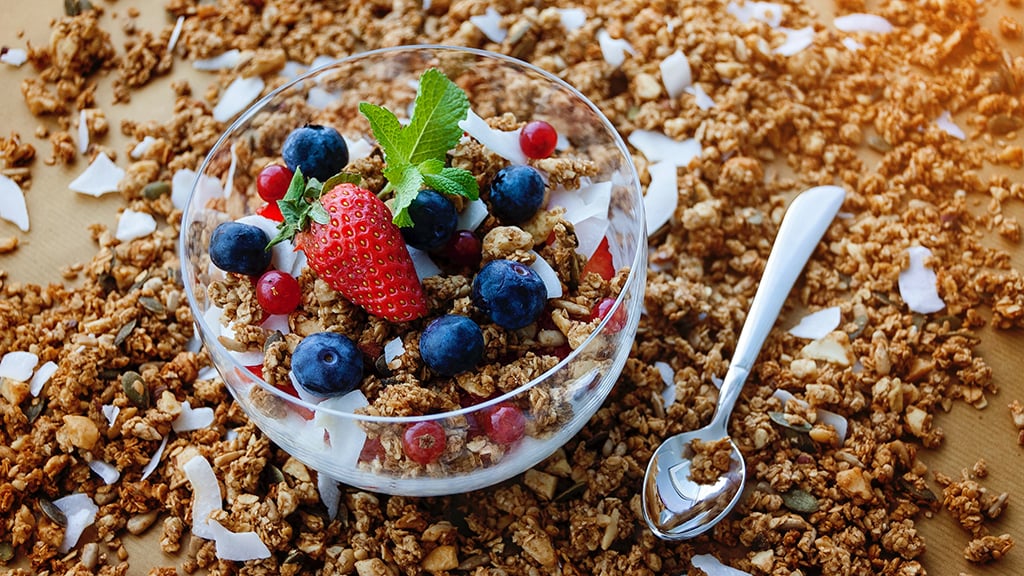What does your breakfast say about you?
It’s been said that breakfast is the most important meal of the day, but new Deakin research has now identified five national breakfast personalities. For example, half of Aussie adults pour themselves a bowl of cereal each morning, while only 11 percent favour a cooked brekky of eggs, bacon, sausages and vegetables.
These breakfast personalities are broadly related to gender, age and socioeconomic factors – but which one are you?
- Wholegrain cereals and milk: Eaten with dried fruit, nuts and seeds, and possibly fresh fruit and yoghurts. People eating this type of breakfast are more likely to be older, married and, in the case of men, have higher education and income levels. They’re also more likely to be non-smokers, physically active and have a healthier weight profile.
- Mixed cereals and milk: The most common type, accounting for more than 30 per cent of women and men. It includes wholegrain or refined grain cereals with regular or reduced fat milk, but no dried fruit, nuts, seed or yoghurt.
- Protein foods: Eggs and/or processed meats, such as bacon or sausages, typically accompanied by refined grain (low-fibre) bread and unsaturated spreads and oils. This is the only breakfast type to include vegetables. It’s more likely to be eaten after 9am and on weekends, and is more popular among younger women and men, and those born in non-English-speaking countries.
- Breads and spreads (type 1): Refined or wholegrain breads with unsaturated spreads, such as margarine, and spreads high in sugar, saturated fat or salt. Most men in this group drink coffee or tea, and tend to be older, be married, have lower incomes, live in an inner regional city and have not worked in the past week. The women in this category prefer wholegrain breads with spreads, are older and more likely to be married.
- Breads and spreads (type 2): Men in this group are more likely to have a sugar-sweetened drink, such as fruit drink, soft drink or cordial, than coffee or tea, are younger and are more likely to have worked in the past week. The women in this category preferred refined-grain bread varieties.
Simple changes can make a big difference
Dr Rebecca Leech from Deakin’s Institute for Physical Activity and Nutrition (IPAN) says that understanding the choices different population groups make when eating breakfast can help tailor meal-specific messages to encourage healthy dietary changes.
‘Breakfast is often a meal we eat out of habit, and making small changes to the food we eat at breakfast can make a big difference to the nutritional quality of our diet overall. These small changes are achievable because they don’t require many cooking skills.’
If your breakfast could be healthier and more nutritious, try some simple changes:
- Choose wholegrain cereals and breads instead of refined-grain varieties – this can help you get the daily fibre you need and reduce the risk of diabetes, bowel cancer and heart disease.
- Have unprocessed rather than processed meat.
- Add tomato or avocado to quality proteins such as eggs.
- Include nuts, seeds, fruit or yoghurts with your cereal.
- Opt for healthy fats such as avocado and nut butters, as well as unflavoured milk, yoghurt and cheese.
Need some brekky inspiration?
For a great start to the day, Dr Leech suggests a slice of wholemeal or grain-rich bread topped with beans, mushrooms and spinach, or half a cup of cooked porridge or other wholegrain cereal, along with some fruit.
Heart Foundation Food and Nutrition advisor Sian Armstrong recommends choosing foods from the Heart Foundation’s Heart Healthy Eating Pattern.
‘Breakfast options include vegetables such as mushrooms, spinach and tomato; bananas, berries and other fruit; oats and wholegrain toast; and healthy proteins including beans and eggs.’
Check out the Heart Foundation website for some mouth-watering breakfast recipes that will have you leaping out of bed each morning!
